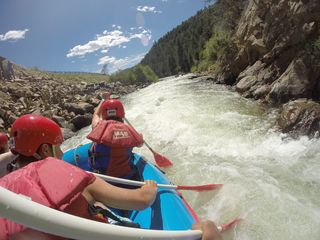Environment
The Psychology of Awe: Awe in Nature
The experience of awe in nature is associated with well-being.
Posted July 18, 2018 Reviewed by Matt Huston

Previous research has shown that interaction with nature, such as walking in natural surroundings, improves psychological well-being; indeed, even viewing slides of natural scenery produces physiological activities associated with the relaxation response.1
Recent research by Anderson and colleagues examines what it is about nature that can be healing.2
Based on two studies in three different populations (at-risk youths, college students, and veterans), the authors conclude that the positive impact of nature on well-being is mediated by the feelings of awe.

Awe
It is not easy to define those spine-chilling wow experiences, in part because so many things (e.g., music, art, nature) can elicit awe. Nevertheless, some researchers have proposed that awe can be broken down into two components—vastness and accommodation.3
We experience vastness when we perceive anything that is much larger than ourselves or than what we are used to perceiving. For example, we experience vastness when we view a mountain up close.
But the concept of vastness need not apply only to physical objects; it can also refer to people of great authority, fame, or ability. Many who have met great public figures in person, for instance, report feeling awestruck.
In addition to vastness, awe also involves the need for accommodation—the adjustment of our cognitive structures, in order to accommodate new experiences of wonder. Which is why awe is also linked with feelings of confusion, disorientation, and fear.
Sometimes we are not able to make sense of our confusing and frightening encounter with the larger-than-life object of awe. But other times we succeed in accommodating this new experience; and when we do, fear and confusion might be replaced by feelings of enlightenment.

Study
Anderson et al., the present paper’s authors, attempted to determine if spending time in nature would result in increased well-being; and if so, whether it would be due to the experience of awe.2
In the first study, 52 at-risk-youths and 72 military veterans participated in a 1-day or 4-day whitewater rafting trip. At the end of each day, the participants were asked to report on their thoughts, emotions, and experiences of that day. Naturally, those who participated in the 4-day rafting trip (about a quarter of the sample) filled out the rafting diary four times, while the rest did so only once. A week later, the participants were sent follow-up questions.
The results revealed that one week after the trip, the participants’ level of well-being was higher than before the trip (the actual questionnaires used can be found here). In addition, in comparison with other positive emotions considered, awe was found to be most predictive of well-being.
The second study, using a sample of 119 undergraduate students, evaluated the link between daily life experiences, awe, and well-being. For the 14-day duration of the study, the participants were required to report on their social experiences, thoughts, and feelings of the day.
They also filled out a measure of long-term well-being, and a measure of various positive emotions (specifically: amusement, joy, pride, contentment, and gratitude). They were then asked to write a narrative about a positive emotion they experienced on that day.
The researchers discovered that on those days that participants wrote about experiences in nature, they also reported feeling more satisfaction. In addition, experiences in nature were more related to the emotion of awe than to any other positive emotion.
Implications
Given that these studies were longitudinal (as opposed to experimental), the researchers hesitate to conclude that the experience of awe in nature is the cause of improvement in well-being.

Nevertheless, these findings add to a body of research on the positive consequences of spending time in nature and the value of positive emotions (especially awe) for our well-being.
So perhaps it is worth our time to spend a little time in nature. And allow ourselves to be wowed. By the mountains. The ocean. And the sunset.
References
1. Gladwell, V. F., Brown, D. K., Barton, J. L., Tarvainen, M. P., Kuoppa, P., Pretty, J., . . . Sandercock, G. R. H. (2012). The effects of views of nature on autonomic control. European Journal of Applied Physiology, 112, 3379-3386.
2. Anderson, C. L., Monroy, M., & Keltner, D. (2018). Awe in nature heals: Evidence from military veterans, at-risk youth, and college students. Emotion. doi: 10.1037/emo0000442
3. Keltner, D., & Haidt, J. (2003). Approaching awe, a moral, spiritual, and aesthetic emotion. Cognition and Emotion, 17, 297-314.


